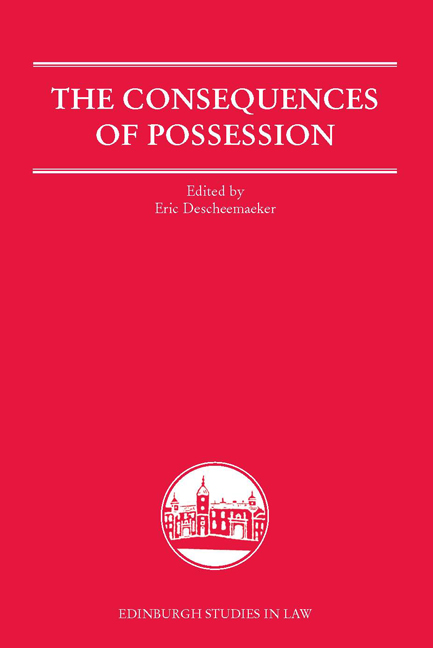Book contents
- Frontmatter
- Contents
- Foreword
- List of Contributors
- Table of Cases
- Table of Statutory Materials
- 1 The Consequences of Possession
- 2 Why Protect Possession?
- 3 Is Possession Factual or Legal?
- 4 Possession as a Source of Property at Common Law
- 5 The Evolution of Possessory Actions in France and Italy
- 6 The Protection of Possession in Scots Law
- 7 Possessio civilissima in Spanish and German Law: Protecting Possession between Fact and Fiction
- 8 Possession of Incorporeals
- 9 The Protection of Quasi-Possession in South African Law
- Index
3 - Is Possession Factual or Legal?
Published online by Cambridge University Press: 07 December 2017
- Frontmatter
- Contents
- Foreword
- List of Contributors
- Table of Cases
- Table of Statutory Materials
- 1 The Consequences of Possession
- 2 Why Protect Possession?
- 3 Is Possession Factual or Legal?
- 4 Possession as a Source of Property at Common Law
- 5 The Evolution of Possessory Actions in France and Italy
- 6 The Protection of Possession in Scots Law
- 7 Possessio civilissima in Spanish and German Law: Protecting Possession between Fact and Fiction
- 8 Possession of Incorporeals
- 9 The Protection of Quasi-Possession in South African Law
- Index
Summary
In An Introduction to Roman Law, Nicholas explains that the question of whether a person can be considered to be in possession of a thing is both a question of fact and a question of law:
[P]ossession was not a fact if by that one means that it was unregulated by law. In the case, for example, of my taking possession of a farm, whether I have entered on the land is indeed a question of fact, but whether such an entry, assuming it to have occurred, amounts to a taking of possession is a matter governed by legal rules.
The notion that “possession” is somehow both a matter of fact and a matter law is often repeated in respect of the common law as well. It can be seen in the common practice of qualifying the word by using terms such as “legal possession”, “constructive possession”, “deemed possession” and “possession in the eyes of the law”. Writing in this vein, for instance, Clarke and Kohler state, “A person who takes physical control of land or goods, with the intention of excluding all others from it or them, acquires possession of it or them as a matter of law”. It can also be seen in the other common practice of distinguishing between using the word to denote a fact and using it to describe a legal concept. Pollock and Wright adopt this approach, drawing a distinction between using “possession” to denote “an actual relation between a person and a thing”, and using it to describe “the state of being possessor in the eyes of the law”. Whilst “possession” may describe a factual state of affairs, these various approaches to possession each suggest that its meaning, at least in part, is defined by law. This chapter aims to explore and ultimately defend this characterisation of possession.
In the first section we will see that lawyers normally use the word “possession” to denote a factual state of affairs. The proof of this is that any litigant wishing to rely on a legal rule which makes reference to “possession” will usually have to introduce evidence of possession.
- Type
- Chapter
- Information
- The Consequences of Possession , pp. 56 - 76Publisher: Edinburgh University PressPrint publication year: 2014



